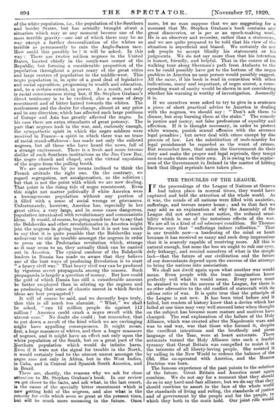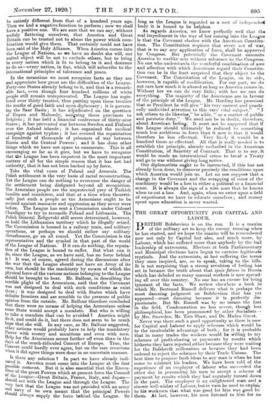11-1E TROUBLES OF THE LEAGUE.
IF the proceedings of the League of Nations at Geneva had taken place in normal times, they would have captured and held the attention of the whole world. As it was, the minds of all nations were filled with anxieties, sufferings, and terrors nearer home ; and to that fact we may add as an explanation of why the Assembly of the League did not attract more notice, the reduced sensi- bility which is one of the notorious effects of the war. We are all in a kind of nil admirari condition. Sir Thomas Browne says that "sufferings induce callosities." That is our trouble now—a hardening of the mind or heart because it has received so many and such deep impressions that it is scarcely capable of receiving more. All this is natural enough, but none the less we ought to rub our eyes, defy lethargy, and remind ourselves of what is the simple fact—that the future of our civilization and the future of our descendants depend upon the success of the attempt to bring the nations into association. We shall not dwell again upon what another war would mean. Even people with the least imagination know perfectly well what it would mean. Every nerve must be strained to win the success of the League, for there's no other alternative to the old conflict of statecraft with its ultimo ratio of war. It is quite true that the principle of the League is not new. It has been tried before and it failed, but readers of history know that a device which has failed at one time may very well succeed later when thought on the subject has become more mature and motives have changed. The real explanation of the failure of the Holy Alliance, which was created after the Napoleonic wars and was to end war, was that those who formed it, despite the excellent intentions and the brotherly and pious language of the Tear, were at heart autocrats. These autocrats turned the Holy Alliance into such a fearful tyranny that Great Britain was compelled to resist it ja the interests of all liberty-loving people. She resisted it by calling in the New World to redress the balance of the Old. She co-operated with America, and the Monroe Doctrine was born.
The famous experience of the past points to the solution of the future. Great Britain and America must again combine. We do not say for a moment that they should do so in any hard-and-fast alliance, but we do say that they should combine to assert in the face of the whole world the standards of living and ruling, the standards of justice and of government by the people and for the people, to which they both in the main hold. Our joint role would be entirely different from that of a hundred years ago. Then we had a negative function to perform ; now we shall have a positive one. We are sure that we can say, without unduly flattering ourselves, that America and Great Britain can be trusted not to abuse the power which com- bination would give them. That certainly could not have been said of the Bfoly Alliance. When America comes into the League of Nations, as we have no doubt she will, our united object will be not to exclude others, but to bring in every nation which is fit to belong to it and desirous to do so—every nation, in fine, which will subscribe to the international principles of tolerance and peace.
In the meantime we must recognize facts as they are and appreciate how great are the difficulties of the League. Forty-one States already below' , to it, and that is a remark- able fact, even though four hundred millions of white people still remain unrepresented. The League has regis- tered over thirty treaties, thus putting upon these treaties the marks of good faith and open diplomacy ; it is govern- ing the Saar Basin ; it has adjudicated on the question of Eupen and Malmedy, assigning those provinces to Belgium ; it has held a financial conference of thirty-nine States.; it has prevented war between Sweden and Finland over the Aaland islands ; it has organized the medical campaign against typhus ; it has secured the repatriation of hundreds of thousands of prisoners of war between Russia and the Central Powers ; ani it has done other things which we have not space to enumerate. This is all encouraging so far as it goes, but we have to recognize that the League has been impotent in the most important matters of all for the simple reason that it has not had authority, that it has not been backed up by force.
Take the vital eases of Poland and Armenia. The Polish settlement is the very basis of racial reconstruction. Yet the League can do nothing to overcome the danger of the settlement being disfigured beyond all recognition. The Armenian people are the unprotected prey of Turkish bandits and murderers, and that at a time when theoreti- cally just such a people as the Armenians ought to be secured against massacre and oppression as they never were before. The League has sent a Commission under Colonel Chardigny to try to reconcile Poland and Lithuania. The Polish General Zeligovski still seems determined, however, to hold the Lithuanian territory which he illegally seized. The Commission is housed in a railway train, and military operations, or perhaps we should rather say military disturbances, go on all round. Yet the Commission is the representative and the symbol in that part of the world of the League of Nations. If it can do nothing, the reputa- tion of the League is bound to suffer. But what can it do, since the League, as we have said, has no force behind it ? It was, of course, agreed during the discussions after the war that the League should not have an Army of its own, but should be the machinery by means of which the physical force of the various nations belonging to the League should be brought to bear. Mr. Balfour, in describing the terrible plight of the Armenians, said that the Covenant was not designed to deal with such conditions as exist there ; it was designed to deal with States which have definite frontiers and are sensible to the pressure of public opinion from the outside. Mr. Balfour therefore concluded that there were no means of helping the Armenians unless some State would accept a mandate. But who is willing to take a mandate that can be avoided ? America might do it, and could do it, but there does not seem to be much hope that she will. In any case, as Mr. Balfour suggested, other nations would probably have to help the mandatory Power with money and munitions and even with men. Help for the Armenians seems further off even than in the days of the much-ridiculed Concert of Europe. True, the Concert could hardly ever agree, but on the rare occasions when it did agree things were done in no uncertain manner.
Is there any solution ? In part we have already indi- cated it. America must come into the League at the first possible moment. But it is also essential that the Execu- tives of the great Powers which at present form the Council of the League--Great Britain, France, Italy, and Japan— should act with the League and through the League. The YeTY fact that the League was not provided with an army lait 'ai._,a,avY of its own meant that the principal Powers c always supply the force behind the League. So long as the League is regarded as a sort of independent body it is bound to be helpless. As regards America, we know perfectly well that the real impediment in the way of her coming into the League Is that the Covenant clashes with the American Constitu- tion. The Constitution requires that every act of war, that is to say any application of force, shall be approved by Congress. But potentially the Covenant commits America to warlike acts without reference to the Congress. No one who understands the wonderful combination of awe and affection with which Americans regard their Constitu- tion can be in the least surprised that they object to the Covenant. The Constitution of the League, on its side, however, is capable of modification. For our part, we do not care how much it is altered so long as America conies in. Without her we can do very little; with her we can do everything. The majority of the Americans are in favour of the principle of the League. Mr. Harding has promised that as President he will give " his very earnest and practi- cally undivided attention to this very vital subject." "I ask others to do likewise," he adds, "as a matter of public' and patriotic duty." We need not be in doubt, therefore, about American feeling. It must not be supposed that if the League should ultimately be reduced to something much less ambitious in form than it now is that it would therefore be less effectual. Very likely it would be a hundred times as effectual. All that is really needed is to establish the principle, already embodied in the American Constitution, of Sanctity of Contract. That is to say, it would be made an internetional crime to break a Treaty and go to war without giving long notice.
Our diplomatists ought to be instructed, if this has not already been done, to discover precisely the conditions upon which America would join us. Let no one suppose that a change in the Covenant and the scrapping of some of the machinery would be a loss in either a political or a financial sense. It is always the sign of a wise man that he knows when to out a loss. And, again, when we enter upon a field of experiment we have to educate ourselves ; and money spent upon education is never wasted.







































 Previous page
Previous page